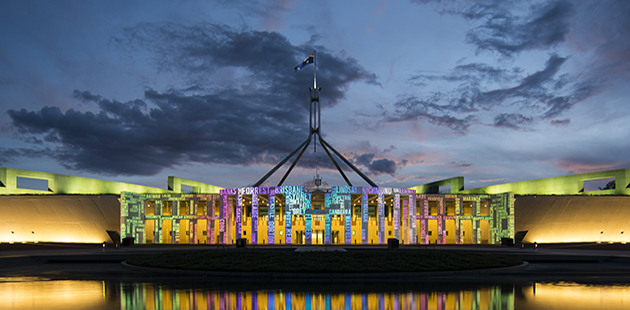 The results of a major survey of political parties on LGBTI issues have revealed important differences in the major political parties. The parties differed significantly on their approach to LGBTI representation and engagement, including on the issues of a party spokesperson and a commissioner for LGBTI affairs.
The results of a major survey of political parties on LGBTI issues have revealed important differences in the major political parties. The parties differed significantly on their approach to LGBTI representation and engagement, including on the issues of a party spokesperson and a commissioner for LGBTI affairs.
“We are pleased that a Coalition Attorney General will have responsibility for LGBTI equality, ensuring that our issues are heard at the Cabinet table,” said Victorian Gay and Lesbian Rights Lobby (VGLRL) Co-Convenor Rachael Hambleton. “However, we are disappointed that Labor has not committed to a party spokesperson for LGBTI affairs. The Greens and the Victorian Labor Party have long had a spokesperson; it’s time federal Labor followed their lead.”
The Greens have put forward a proposal to establish a Commonwealth Commissioner for Gender and Sexuality, which would be able to work across Government to provide support for the LGBTI community.
“Whilst the Labor party’s proposal to establish an LGBTI Discrimination Commissioner and the Coalition’s plan to give the new Human Rights Commissioner responsibility for LGBTI affairs are both welcome,” said VGLRL Co-Convenor Sean Mulcahy. “We believe the Commissioner should not be stuck at the Human Rights Commission but able to work within Government to advance the rights of LGBTI Australians.”
Two issues that have dominated the media have been the Safe Schools program and balancing religious freedom with LGBTI equality.
“We welcome the Opposition Leader’s comments in support of Safe Schools, but those words need to be backed by funding. The Coalition needs to explain what they are going to do to when the funding contract for the Safe Schools Coalition programme ends given that they will not extend the funding,” said VGLRL Co-Convenor Rachael Hambleton.
“Given that faith leaders such as the Australian Christian Lobby’s Lyle Shelton and the Archbishop of Sydney say they would not use religious exemptions to discriminate against LGBTI Australians in critical service delivery, we are disappointed that neither of the major parties would commit to amending the law to end discrimination against LGBTI Australians in service delivery,” said VGLRL Co-Convenor Sean Mulcahy.
Marriage equality and the proposed marriage plebiscite has been another strong focus of the election campaign.
“Upwards of 70% of Australians now support marriage equality. To deny a free vote on marriage equality, to deny the will of the vast majority of Australians, and to deny LGBTI Australians their right to equality, dignity and respect is a statement which says that our love is not equal,” said NSW Gay and Lesbian Rights Lobby (NSW GLRL) Co-Convenor Lauren Foy. “We will continue to fight for a free vote in Parliament and for the passage of marriage equality.”
The parties also made commitments to the health and wellbeing of LGBTI people, including improvements to aged care services.
“We are encouraged to see all the major parties make commitments to the health and wellbeing of LGBTI people,” said Victorian AIDS Council (VAC) CEO, Simon Ruth. “We are delighted to see parties have highlighted the unique health needs of LGBTI people and provided strategies for addressing them.”
“Across all measures, LGBTI people are more likely to experience poor health outcomes and have greater difficulty accessing care. Whatever party forms government, we will work with our community partners to ensure the parties follow through on their commitments to LGBTI health.”
“Unfortunately, there were no solid commitments from the two major parties to renew the National LGBTI Ageing and Aged Care Strategy beyond 2017. Older LGBTI Australians need support and we need to continue the reform in aged care towards an inclusive sector. Good strides have been made and need to be continued,” said VAC CEO, Simon Ruth.
There is also increasing awareness of the plight of LGBTI asylum seekers seeking refuge in Australia.
“There is an increasing number of refugees seeking protection in Australia based on their LGBTI status with at least 77 countries worldwide criminalising homosexual behaviour,” said NSW GLRL Co-Convenor Lauren Foy. “LGBTI asylum seekers are some of the most vulnerable individuals held in detention around the world and should not be repatriated to their country of origin if it would compromise their safety.”
The survey also addressed specific issues facing the transgender, gender diverse and intersex communities, with the parties making commitments to support the health and wellbeing of these communities.
“It is wonderful to see some political parties finally begin to address the stigmatisation and treatment of people born with intersex bodies, in line with concerns stated by the United Nations and other international human rights organisations,” said Organisation Intersex International (OII) Australia Co-Chair, Morgan Carpenter.
“We urge all those with an interest on LGBTI issues to carefully examine these responses which we believe cover our communities comprehensively,” said Transgender Victoria (TGV) Executive Director, Sally Goldner. “From the trans and gender diverse perspective, we note in particular the responses regarding critical health and medical issues for trans and gender diverse people of all ages.”
The survey organisers urge all LGBTI Australians and anyone with an interest in supporting these communities to pay close attention to the results.
“This election is going to be a close one, so it’s more important than ever that voters who care about LGBTI issues know not just where their candidate stands but also what the party policies will be,” said VGLRL Co-Convenor Sean Mulcahy.
For more information, and to view complete survey responses and assessment, visit: www.rainbowvotes.com.au for details.
Image: Parliament House, Canberra
